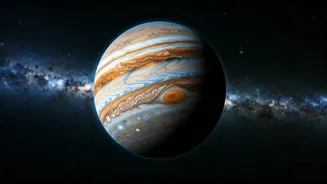Giant's Gravitational Dominance
Jupiter, the largest planet in our solar system, boasts a gravitational pull that is significantly stronger than any other planet. This immense gravitational influence
stems primarily from its sheer size and mass. It is more than twice as massive as all the other planets combined. This enormous mass concentrates a vast amount of gravitational force, effectively creating a deep 'gravity well'. Objects, whether they are small asteroids or even other planets, are drawn towards Jupiter because of this unrelenting force. The strength of this gravitational pull diminishes with distance, but its impact is still felt far beyond Jupiter's immediate surroundings. The planet's powerful gravity dictates the orbits of many celestial bodies, acting as a cosmic shepherd, guiding and sometimes even capturing them. Consequently, understanding Jupiter's gravity is crucial to understanding the dynamics and evolution of our solar system.
Factors Affecting Gravity
Several factors contribute to the phenomenal gravitational force exhibited by Jupiter. The principal factor, as mentioned earlier, is its massive size. The planet’s substantial volume contains a tremendous amount of matter, and this mass is directly proportional to its gravitational strength. Another pivotal aspect is the density of Jupiter. Its structure, primarily composed of hydrogen and helium, is extremely dense at the core. This dense core further augments the overall gravitational pull. Moreover, Jupiter's rapid rotation plays a role. Although the effect is smaller compared to its mass, the centrifugal force generated by its quick spin slightly counteracts gravity at the planet's equator, thereby creating a subtle flattening of the planet's shape. Analyzing these elements collectively provides a comprehensive understanding of why Jupiter's gravity is so intense and how this influences other celestial bodies within its domain.
Capturing and Controlling
Jupiter's potent gravity doesn't just attract; it also captures. Numerous celestial bodies, like comets and asteroids, have found themselves ensnared by Jupiter's gravitational pull and are now in orbit around the giant planet. These captured objects, or moons, bear witness to the planet's gravitational might. Jupiter currently has 95 known moons. The most famous ones, the Galilean moons – Io, Europa, Ganymede, and Callisto – are a testament to the planet’s profound gravitational influence. Furthermore, Jupiter's gravity has a controlling effect. It acts like a planetary shield. Jupiter's gravity clears out debris from the inner solar system, and it also deflects comets and asteroids that might otherwise pose a threat to the inner planets. The planet’s gravitational influence is so significant that it helps determine the overall configuration and stability of the solar system, making it a critical element in understanding planetary dynamics.
The Solar System's Guardian
Jupiter's massive gravity has a significant impact on the rest of the solar system, acting like a cosmic guardian. It helps shield the inner solar system from potentially devastating impacts by diverting or ejecting asteroids and comets. By exerting its gravitational pull, Jupiter significantly reduces the risk of collisions with Earth and other inner planets. This protective effect, often likened to a 'celestial vacuum cleaner,' is crucial for the ongoing stability of our planetary neighborhood. Additionally, Jupiter’s gravitational forces affect the orbits of other planets. Its powerful gravity occasionally nudges other planets in their paths, thereby contributing to the complex dance of gravitational interactions that define the structure of our solar system. The understanding of Jupiter's role in influencing the solar system provides invaluable insights into the history and evolution of our planetary system, and continues to be a subject of intense scientific investigation.


















